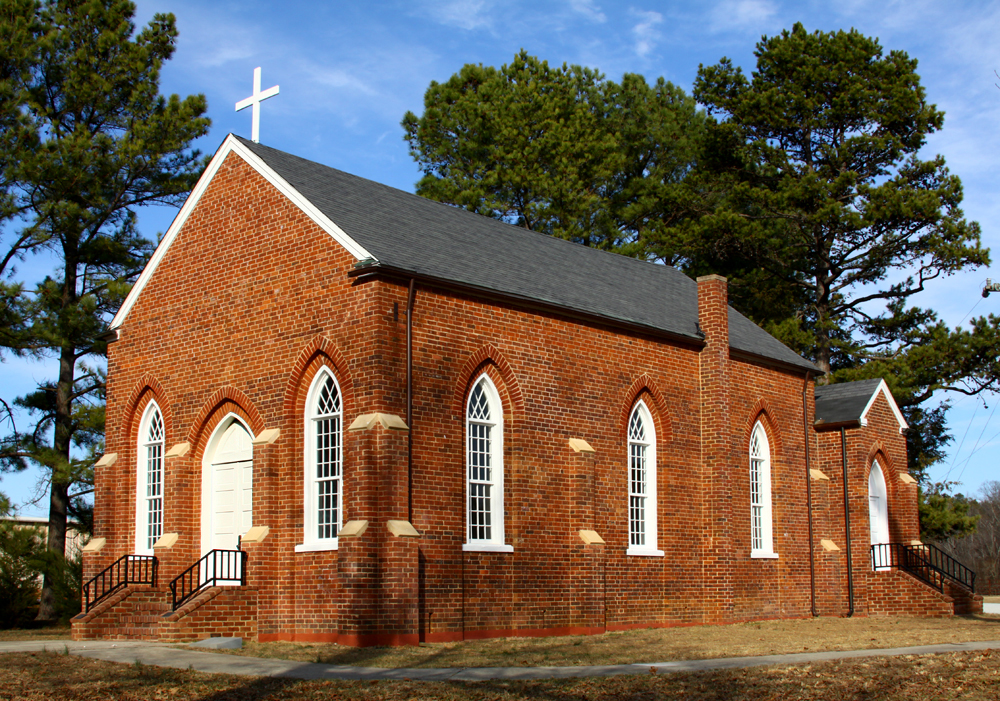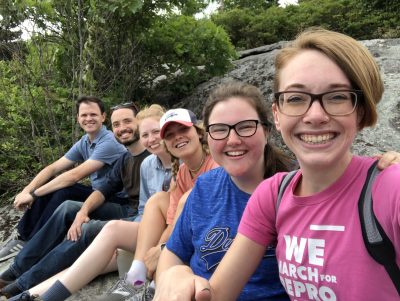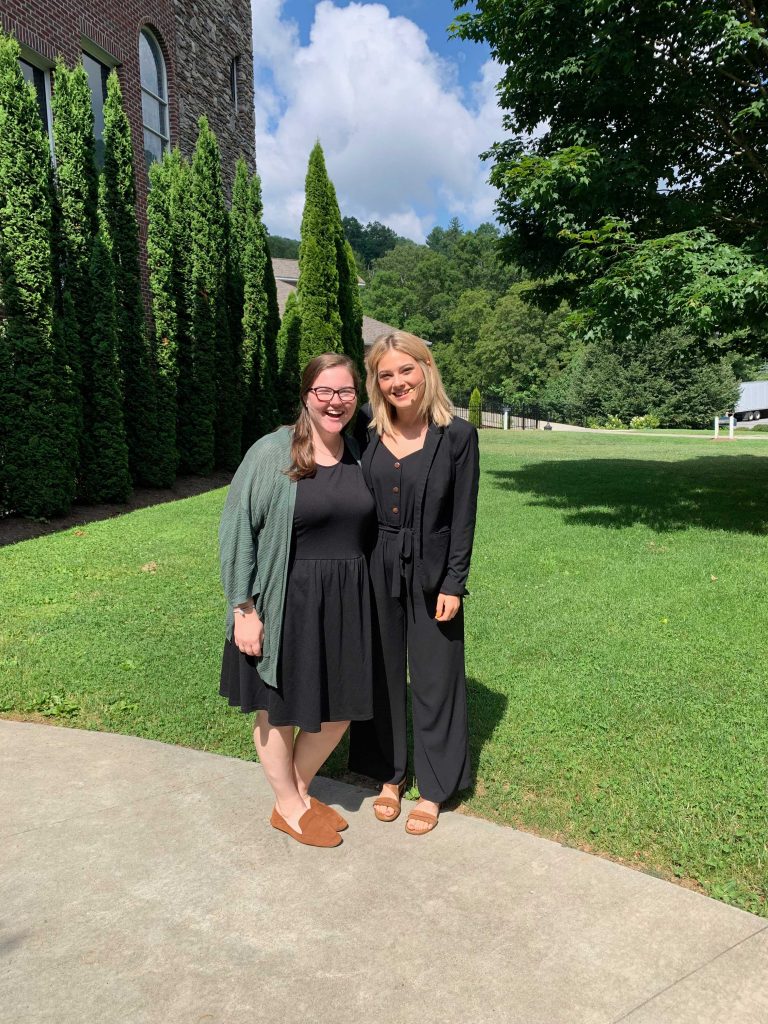Communities of Learning
Forging connections between churches and communities
By Yonat Shimron
This summer, 176 Duke Divinity students, serving as interns in churches across the country as part of their field education requirement, will also participate in a Community of Learning. The following story, written while the Communities of Learning program was still in its pilot stage, describes how it functioned prior to the Covid-19 shutdown.
In the first part of the Spring 2020 semester, students in the program met once a week in the town or city where they served to learn from one another about leadership and to hear from community leaders about the particular needs and opportunities in those places.
In the wake of the novel coronavirus outbreak, those weekly gatherings moved online.
But the success of the pilot has convinced Divinity School administrators that the Communities of Learning model should be extended to all students fulfilling their field education requirements. Surveys and interviews with students suggest Communities of Learning help interns cultivate practical leadership skills while drawing connections with their academic studies.
“We’re so glad we have been prototyping this model for theological education because it will be a gift, a way to wrap a healthy structure around students this summer that will keep them learning and engaged, even as they have to do that at a distance,” said Rhonda Parker, senior director of ministerial formation and field education at Duke Divinity.
In due time, the Communities of Learning program may resume as an in-person gathering. Once a month, those gatherings will include meetings with community leaders or a communal activity, such as the one described in the story below.
Equipping the Next Generation

Students in the Hillsborough Community of Learning at the Martin Luther King Day march
On a bright but frigid January morning, 10 Duke Divinity School students assigned to work as interns at churches in and around Hillsborough, N.C., gathered outside the county courthouse for the Martin Luther King Jr. Commemorative March.
From the courthouse they walked alongside some 200 town residents to Mt. Bright Missionary Baptist Church, a predominantly African American church five blocks away, where they took their seats for a long litany of songs and speeches celebrating the life and achievements of the iconic preacher and civil rights leader. Afterward, they huddled together in a church Sunday school classroom for a quick reflection.
“First, a number from one to 10: How are you doing?” Rhonda Parker, senior director of ministerial formation and student life at Duke Divinity asked the students. “And then, a word or phrase you’re taking with you from today.”
Ministerial interns have not previously gathered as a group for community events like this one, outside the walls of the particular congregations they are serving. But as part of a new Divinity School pilot called Communities of Learning, clusters of students all interning at churches in the same geographic area gather on Monday mornings for worship, learning reflection, and a meal. At least once a month, they also head out to meet with community leaders or nonprofit groups or to participate in events such as the MLK commemoration. The Hillsborough cohort has visited the county prison, met the mayor, toured an antebellum girls’ school, and sat down with leaders of two nonprofits working with low-income residents.
The idea is to better equip the next generation of church pastors to be leaders—not only in their congregations but in the world.
“The World As My Parish”
In some ways, it’s an old idea. John Wesley, the founder of Methodism, famously said, “I look upon the whole world as my parish.” Yet the training for many students has traditionally been much more narrow.
“Students weren’t always able to make connections between the work they were doing in their individual contexts and the wider community,” said Parker, who conceived the pilot alongside Field Education Director Daniel Corpening. “Our hope here is that we’re forming faith leaders for the church and for the world.”

Duke Divinity students participate in a march to commemorate Martin Luther King Day in Hillsborough, N.C.
In Hillsborough, a historic town of 6,000 people with a sizable African American community and a growing white suburban creative class, the Communities of Learning cohort is gaining an appreciation for the people, places, and problems facing the town and its churches. Following the Martin Luther King Jr. Commemorative Celebration, the students stood in a circle and reeled off a word or phrase that came to mind following the MLK service.
“Remember,” said one student.
“Speak out,” said another.
“Move,” said a third.
For many, the Communities of Learning experience has been an especially meaningful way to learn about the larger community alongside their peers.
“If I was not a part of this, I would have no idea what Hillsborough was like,” said David Walley, a second-year M.Div. student who serves as an intern at Union Grove UMC in town. “I would drive 20 minutes to the church, handle whatever I was doing, get into my car and drive 20 minutes back. I would have no knowledge, no awareness, of the town or the people or the history or anything that goes on outside the walls of the church.”
Reshaping the Emphasis to Respond to Changing Needs
Theological education is changing. Divinity schools like Duke, best known for their academic rigor in Bible, theology, and church history, are reshaping their curricula to better help students in practical ministry, too.
The reasons have everything to do with changes in society at large. Mainline Protestant churches are facing a long and slow decline, with birth rates and baptisms dropping and member rolls graying. In this environment, classical theological training is not enough. Church pastors can no longer expect that people in the pews will listen to their sermons and heed their teachings, much less look up to them just because they wear a collar or a robe.
“Younger people are skeptical of institutions, and especially religious institutions,” said Christian Scharen, who leads the Center for the Study of Theological Education at Auburn Seminary and undertook a study of Duke’s field education program.
To be effective, pastors must learn to lead. A big part of leadership is the ability to forge relationships, not just in the church but also in the wider community.
“Duke is asking itself: ‘Can we continue to produce smart pastors who don’t have deepened leadership capacity?’“ Scharen said. “Their answer is: ‘No—we need to deepen our commitment to field education and think about ways to create more dynamism between what happens in the classroom and the field education experience’.”
The Communities of Learning model was born of that desire to focus more intently on practical leadership training.

St. Mary’s Chapel, Hillsborough, N.C.
Practical Ministry and Establishing Relationships
Back in 1917—even before the university became Duke—students studying to become pastors participated in a summer preaching program, the forerunner to today’s field education requirement.
Today, the Divinity School requires every M.Div. student to complete two units of field education—totaling 800 hours—to graduate. At least one of those units must be in a church, and most students receive a stipend for their work. (Students may complete a second field education in a nonprofit or chaplaincy setting.)
For many students, field education is life-changing. In surveys, students say interning at churches confirmed their call, boosted their confidence, and improved their pastoral skills.
But students also indicated they needed more training in the basics of church management and finances. They saw a lack of integration between their academic studies and practical ministry. And they said the two required peer reflection sessions at each field education unit were not sufficient.
To meet those challenges, the field education office rolled out a Communities of Learning pilot in the summer of 2019. Four towns in North Carolina where a group of Duke Divinity students were serving in the same geographic area were chosen: Boone, Canton, Pittsboro, and Saxapahaw.
This academic year, the school extended the pilot. In addition to Pittsboro and Saxapahaw, two new North Carolina towns, Hillsborough and Henderson, were added. (Boone and Canton in the western part of the state, were dropped due to their distance from Duke.)
In each Community of Learning, students and their supervising pastors spend one morning a week in worship, reflection, and learning. A faculty member often accompanies the group to help create a feedback loop where what’s learned in the field can be incorporated back into the classroom and vice versa.
A survey of the initial pilot found that students were especially inspired by the collaborative emphasis of the program.
“Something I really appreciated about this program is that it gives us practical examples of what it looks like to network in the community,” said Amy Lambert, a third-year student. “They tell us it’s important to establish relationships because those relationships will help you in your ministry. This Community of Learning is a practical way of living into that.”
Ministry to the Entire Community
For Bailey Brislin, a second-year student, the benefits of the Communities of Learning model of field education were obvious from the get-go. In the summer before she began her M.Div. studies, she had served as an intern at a United Methodist Church in Manteo, on the North Carolina coast. That entire summer, she was on her own.
“I didn’t know a single person when I moved there, said Brislin, 23. “Probably the thing I struggled with most is being isolated and alone.”
Even the two required peer reflection sessions she participated in that summer meant a three-hour drive to the town of Wilson.
 Divinity students in the Boone Community of Learning hike with Daniel Corpening (far left), director of field education, in 2019
Divinity students in the Boone Community of Learning hike with Daniel Corpening (far left), director of field education, in 2019
When she signed on to the first Communities of Learning pilot in Boone the following summer, she arrived at her assigned church with four fellow students—all serving nearby congregations.
“We were meeting regularly to process things and do life together,” Brislin said. “We served as a family for one another that summer.”
 Boone UMC interns Bailey Brislin and Quincie McConathy
Boone UMC interns Bailey Brislin and Quincie McConathy
The Rev. Lory Beth Huffman, Brislin’s supervisor, immediately noticed the value of the team approach in the Communities of Learning model.
“They had the support of one another,” said Huffman, pastor of Boone UMC. “I think that’s huge in ministry where we can become lone rangers. They were learning how important it is to be connected with other clergy, sharing experiences and leaning on one another.”
Over the course of that summer, the cohort met with representatives of Appalachian State University, the town’s largest employer, to discuss town-gown relations. They talked to volunteer firefighters about pastoral care to people in crisis. They sat down with a rabbi of a Boone synagogue to discuss interfaith relations in town.
“It gave me a model of being proactive and thinking early on of what it looks like to form relationships with other pastors and clergy in the area, across denominations, just to strengthen my own imagination for what it means to be a church,” Brislin said.
This year, Brislin decided to do another field education within a Community of Learning, this time in Saxapahaw, a growing bedroom community in Alamance County. There, she and her cohort met with farmers and developers. Later this semester, they plan to paddle down the Haw River, a tributary that flows through the town on its way to the Cape Fear River.
“My focus was not just on the church where I was serving,” she said. “The Communities of Learning changed my focus to: ‘What does it mean to do ministry here in this community?’”
Based on the positive feedback the program has been receiving, the Divinity School would like to make the Communities of Learning experience available to all students in the master of divinity program, at least for one of the field education requirements.
At a time when the church and the nation are so divided, Duke Divinity leaders think the Communities of Learning model is more important than ever as a way of preparing practical leaders for effective, even prophetic, ministry.